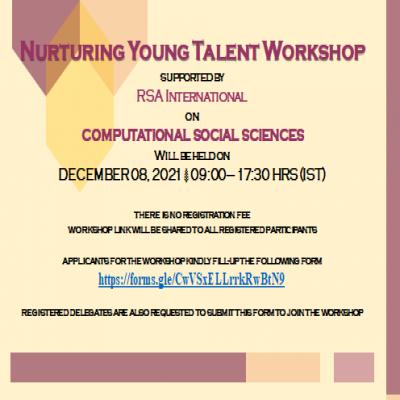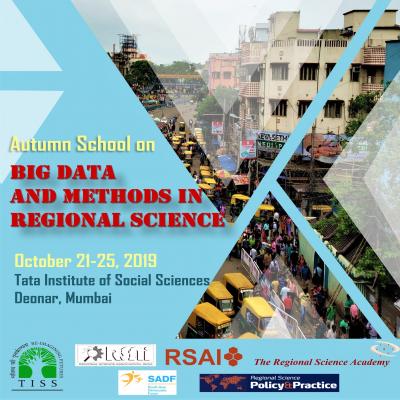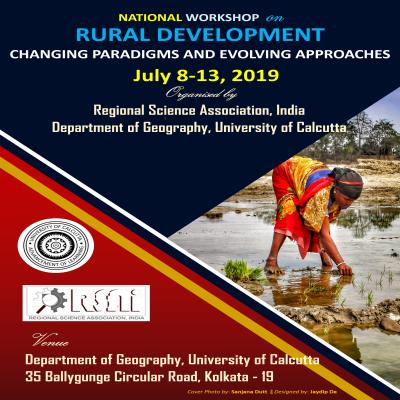


supported by
on
will be held on DECEMBER 08, 2021 @ 9.30 -9.45 HRS (IST)
registered delegates are also requested to submit this form to join the workshop
Submit the form: https://forms.gle/CwVSxELLrrkRwBtN9
https://us02web.zoom.us/j/85649023689
Meeting ID: 856 4902 3689

Big Data and Methods in Regional Science :-
The Regional Science Association of India in collaboration with Tata Institute of Social Sciences, supported by the Nurturing Young Talent Programme of the Regional Science Association International is going to organise the Autumn School during 21-25 October, 2019.
Objectives of the Autumn School :-
To provide a platform for enhancing teaching-learning and research experiences of participants with a view to establishing and expanding the knowledge base on a range of contemporary methods in spatial analysis that are used in addressing issues in regional science.
Concept Note :-
In celebration of the Golden Jubilee of Regional Science Association, India, we are privileged to hold our first Autumn School on Big Data and Methods in Regional Science in commemoration of the birth centenary of Professor Walter Isard.
Researchers in regional science use different methods of spatial and social analysis. There is a constant need to re-think and re-imagine methods and models, to evaluate the state-of-the-art technologies, software and models available to enhance the research output both in terms of quality and dissemination. At this juncture, one of the prime reasons for this re-think is the onslaught of data upon researchers. According to an article in Forbes magazine, by 2020, some 2 megabytes of information will be generated every second per person. Making sense of Big Data is the current challenge and researchers must constantly review methods of analysis. The workshop will incorporate technical sessions wherein experts will share their experiences of use and applicability of contemporary methods in spatial analysis of big data, debate and discuss with participants and also facilitate the hands-on use of software in case of data analytics, spatial statistical modelling, GIS and Remote Sensing. The experts will expect participants to defend their research papers on the basis of comments/suggestions that will pre-date the workshop. The aim is to bring together resource persons and instructors from different sub-themes of Regional Science and also to have special sessions dedicated to planning and policy matters, with special reference to urban planning. We aim to create a melting pot of academicians and policy makers to create a new agenda for Regional Science in the coming years. The dissemination of research in regional science, handling big data and data analytics with renewed synergies are expected to be the clear outcomes of the proposed workshop.
Participants :-
Applicants are expected to have clear research goals pertaining to the theme and a good understanding of spatial science (geography, economics, planning and allied subjects). Applicants should have completed Masters and enrolled / applied for Research positions. Early career researchers may also apply. Basic statistics, soft-computing skills and GIS knowledge is necessary. Selections will be based on the research proposals being evaluated by a Review Committee comprising members of International and India section.
Application Process :-
The Autumn School is open to early career researchers (pursuing Ph.D., Post Doctoral Research) and faculty members. Step I:
Applicants must submit (in PDF) to rsaitiss.autumnschool@gmail.com along with the following documents:
(a) A covering letter expressing the relevance of the workshop to his/her academic career (b) A research concept note (max 2-3 pages) will be the basis of selection. It must contain (i) relevance and discussion of the problem including its applicability (ii) clear research questions (iii) literature review (iv) analytical framework and (v) expected outcomes. (c) Brief current CV
Step II:
On being selected, full papers must be submitted in order to be enrolled for the workshop
(a) Each paper will be allocated to a subject expert who will provide insights and suggestions on the paper well ahead and will also act as discussant for sharpening the research skills adopted in the study. (b) After the workshop, select papers will be published in a forthcoming volume of the journal Regional Science: Policy and Practice (The RSAI journal published by John Wiley &Sons Inc., (based on selection by the editorial board and reviewers).
All the applicants are requested to fill up the registration form using the link: https://docs.google.com/forms/d/e/1FAIpQLSe99P8mqFTHJrx3vS719IKN3KSDVPGKQNXVDVGdehHV sZx-Ow/viewform
Special Session:-
A Special Session “In the footsteps of Professor Walter Isard” is proposed to be organized by the Regional Science Academy (TRSA) in memory of Prof. Isard (2019 being his Birth Centenary).
Important Dates:-
Preliminary application (Step I) extended deadline: August 10, 2019
Notification of selection: August 20, 2019
Full paper submission within: September 20, 2019
Registration within: September 20, 2019
Registration Fees:-
Members of RSA India and RSAI: INR 4000
Non-members (SAARC): INR 5000
Non-member Non-SAARC countries: 100 €
Registration fees will cover study material, lunch and tea, field visits.
Bank Details for Registration:-
Name of the Bank: State Bank of India
Account No. : 37364653656 (Current Account)
Address: Bikash Bhavan, Salt Lake
Beneficiary: Regional Science Association, India
IFSC: SBIN0007816
Swift Code: SBININBB334
Currency: INR
The Registration fees should be paid by bank transfer only, followed by an email to rsaitiss.autumnschool@gmail.com enclosing the receipt (proof of payment) for the record. The registration process should be completed on or before September 20, 2019 (Extended).

The Regional Science Association of India in collaboration with the Department of Geography, University of Calcutta International had organise the National Workshop during 8-13 July, 2019. The basic objective is to create a forum for debating key issues of rural development in India at the present juncture. The concerns of the rural sector relate to impacts of neoliberal growth, outflow of resources both natural and human, rapid degeneration and pollution of the environment and persistent issues related to implementation of adhoc schemes and programmes over the years. The benefit-cost ratio is alarming, while poverty and inequality still remains - what then, are the new approaches and ways to analyse the present situation and evaluate the ways and means of confronting the contentious issues in rural development?